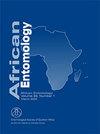南非水生杂草生物防治规划综述
IF 1.2
4区 农林科学
Q3 ENTOMOLOGY
引用次数: 6
摘要
针对入侵大型植物的生物防治(生物防治)是南非历史最悠久的规划之一,始于20世纪70年代针对水葫芦、Pontederia crassipes Mart。(Pontederiaceae)。从那时起,共对6种杂草(主要是浮游植物)释放15种药剂(昆虫13种,螨1种,病原菌1种),取得了良好的效果。特别是水葫芦飞虱(半翅目:飞虱科)的释放,自2018年以来改善了水葫芦的生物防治前景。然而,在过去的十年中,一组新的淹没和根系入侵植物已经成为研究的目标。第一次释放是针对南非的一种淹没的大型植物,第一次释放是针对巴西的水草Egeria densa Planch。(Hydrocharitaceae),在世界任何地方,都是通过释放一种采叶蝇,Hydrellia egeriae Rodrigues-Júnior, Mathis & Hauser(双翅目:叶蝇科)来实现的。黄旗鸢尾(鸢尾科)和墨西哥睡莲(Nymphaea mexicana Zucc)。(Nymphaeaceae),也是世界上第一次作为生物防治的目标,目前正处于药剂开发的早期阶段。释放后的评估、长期监测和控制实验突出表明,需要采取更全面的方法来管理南非的水生入侵植物,这些植物的存在主要是由富营养化驱动的,导致了漂浮和淹没入侵状态之间的政权转变。本文章由计算机程序翻译,如有差异,请以英文原文为准。
A Review of the Biocontrol Programmes Against Aquatic Weeds in South Africa
Biological control (biocontrol) against invasive macrophytes is one of the longest standing programmes in South Africa, initiated in the 1970s against water hyacinth, Pontederia crassipes Mart. (Pontederiaceae). Since then, 15 agent species (13 insects, one mite and one pathogen) have been released against six weeds, most of which are floating macrophytes, with excellent levels of success. The release of the water hyacinth planthopper Megamelus scutellaris Berg (Hemiptera: Delphacidae) in particular, has improved biocontrol prospects for water hyacinth since 2018. In the last decade, however, a new suite of submerged and rooted emergent invasive macrophytes has been targeted. The first release against a submerged macrophyte in South Africa, and the first release against Brazilian waterweed, Egeria densa Planch. (Hydrocharitaceae), anywhere in the world, was achieved with the release of a leafmining fly, Hydrellia egeriae Rodrigues-Júnior, Mathis & Hauser (Diptera: Ephydridae). Yellow flag, Iris pseudacorus L. (Iridaceae) and Mexican waterlily, Nymphaea mexicana Zucc. (Nymphaeaceae), have also been targeted for biocontrol for the first time worldwide, and are in the early stages of agent development. Post-release evaluations, long term monitoring and controlled experiments have highlighted the need for a more holistic approach to managing aquatic invasive plants in South Africa, whose presence is largely driven by eutrophication, resulting in regime shifts between floating and submerged invaded states.
求助全文
通过发布文献求助,成功后即可免费获取论文全文。
去求助
来源期刊

African Entomology
生物-昆虫学
CiteScore
2.00
自引率
0.00%
发文量
17
审稿时长
6-12 weeks
期刊介绍:
African Entomology (ISSN 1021-3589 – print / 2224-8854 – online) replaced the old Journal of the Entomological Society of Southern Africa in 1993. A single volume consisting of two issues (March and September) is published annually. The journal is indexed in all major abstracting journals
African Entomology is a peer reviewed scientific journal that publishes original research articles and short communications on all aspects of entomology, with an emphasis on the advancement of entomology on the African continent.
 求助内容:
求助内容: 应助结果提醒方式:
应助结果提醒方式:


